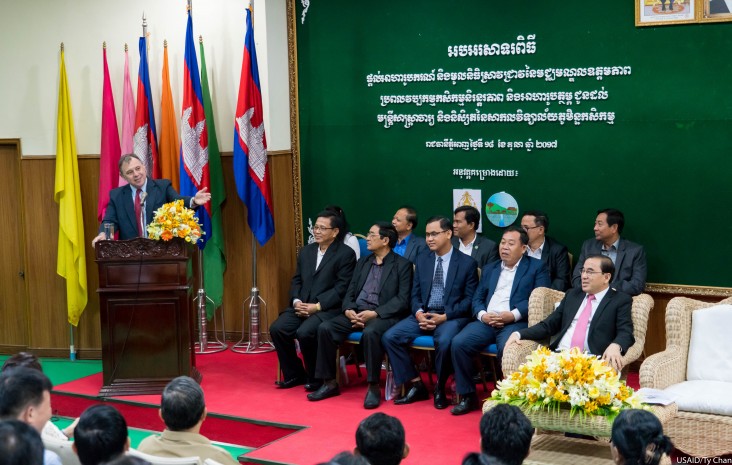Speeches Shim

(as prepared for delivery)
- H.E. Veng Sokhon, Minister of Agriculture, Forestry and Fisheries
- Dr. Ngo Bunthan, Rector, Royal University of Agriculture
- Faculty, students, distinguished guests, ladies and gentlemen
I’m delighted to be here this morning with Minister Veng Sokhon, Rector Dr. Ngo Bunthan and the students and the faculty of the Royal University of Agriculture to see some of Cambodia’s most exciting agricultural research and teaching and to witness the awarding of some very important scholarships and research grants.
When we were together in this room last [September], we agreed to come back after a year to see for ourselves whether CESAIN was living up to its promise. After all, it’s easy to host a big opening ceremony, but the real work always comes later.
And from what I’ve seen so far this morning, I have to say I am impressed. I see a very dedicated group of faculty and students who are conducting and supporting cutting edge research and are making this center into a place where Cambodia’s top agricultural scientists are solving problems to modernize the agricultural sector.
And of course, modernizing and diversifying the agricultural sector is one of the key development challenges facing Cambodia. I know you all understand that, or else you wouldn’t be here. Despite the very impressive industrial growth of the past decade, over 70 percent of Cambodians still make their living from agriculture.
It’s very clear that Cambodia will remain a country that depends on agriculture for economic growth and poverty alleviation for the foreseeable future. And despite a great deal of progress in Cambodian agriculture, there is still a lot of work to be done and a lot of room for innovation.
Cambodia should feel proud that it has produced enough rice for its people for over 20 years now. That is a very important milestone. But Cambodia still imports a majority – 70 percent – of its fruits and vegetables, so one of the next key challenges is developing the horticulture sector as part of overall agricultural diversification.
Mr. Minister, I’ve been very impressed both with your Ministry’s work in this area, and the innovation and creativity that the RUA is bringing to this challenge.
The scholarship and grants we are awarding today are helping create “home grown” agriculture experts. I had a few moments last night to read through the some of the scholarship and research profiles and I was very impressed. For example, Pinn Thira who received a PhD here at RUA will study how to improve agribusiness development for rural farmers. Is Pinn Thira here today?
And I would also like to recognize the Director of the Center, Dr. Hok Lyda, who received a scholarship from USAID for his PhD in soil science from the North Carolina Agricultural and Technical State University. We are delighted that Dr. Hok has returned to Cambodia to share his expertise and knowledge with a new generation of Cambodian students.
Young scientists like Pinn Thira and Dr. Hok are finding Cambodia-specific solutions to some of the biggest challenges facing the agricultural sector. They reflect a very inspiring drive for improvement in Cambodia and its people. I admire how quickly Cambodia is adopting new technologies, adapting them to its national conditions, and sharing them with farmers.
The success of this partnership between the RUA faculty, U.S. universities, and Ministry of Agriculture and USAID reflects a long term commitment by the United States to agricultural development and food security. The U.S. government has built the capacity of dozens of agricultural universities around the world, and provided scholarships to thousands of young scientists, so that they can give back to their countries by helping modernize agriculture.
I also want to congratulate RUA for impact it is making on ordinary Cambodian farmers’ lives. As a result of RUA’s research partnerships, many farmers today are making more money selling vegetables raised using integrated pest management techniques. They are also planting improved varieties of rice that can withstand floods and droughts.
Of course, farming is not just planting vegetables and rice. And it’s not just research projects either. It is also a business, one that is becoming more tightly connected to international markets and more dependent on international market forces. In these respects, agriculture is not much different than the manufacturing, tourism, or technology sectors. For success in all these fields, Cambodia needs smart, young, dedicated people like yourselves.
And that, more than anything is why I’m so optimistic about the RUA, this center, and Cambodian agriculture. With a little help from your international partners, I’m confident you will be able to develop and modernize Cambodian agriculture, produce safe and nutritious home grown food, and drive forward Cambodia’s development.
Thank you very much.
Related Speeches
- Remarks by Menglim Kim, Project Management Specialist, USAID/Cambodia, USAID Greening Prey Lang Final Youth Debate
- Remarks by Ms. Hanh Nguyen, Deputy Mission Director USAID/Cambodia, Health Professional Councils’ Strategic Planning Orientation Workshop
- Remarks by John Eyres, Director, Office of Public Health and Education, USAID/Cambodia, Dissemination Workshop of the Fifth National Strategic Plan for a Comprehensive & Multi-sectoral Response to HIV & AIDS in Cambodia

Comment
Make a general inquiry or suggest an improvement.